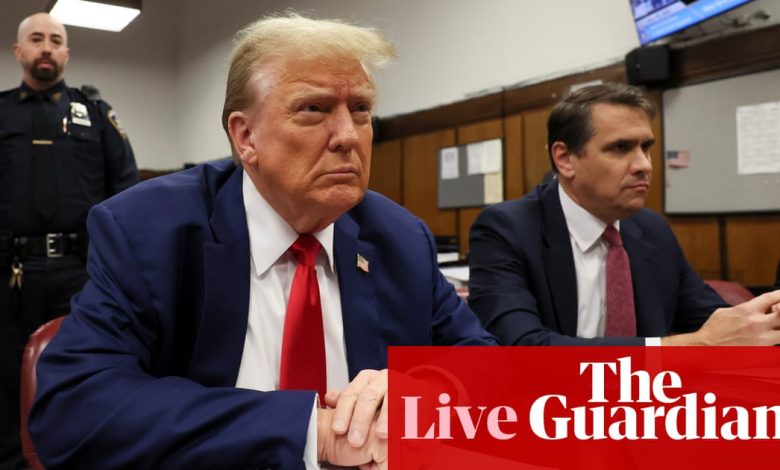Former Trump accountant tells hush-money trial ex-president ‘personally signed’ checks to Cohen – live | Donald Trump trials

Accountant says Trump “personally signed” Cohen’s checks
Prosecutors asked the Trump Organization’s former accountant Deborah Tarasov for various business documents showing payments to Michael Cohenincluding canceled checks from the Donald J Trump Revocable Trust.
Several canceled copies of checks were shown in court, including the previously mentioned $70,000 check signed by the Trump Org’s former chief financial officer Alan Weiselberg and Eric Trumpone of Trump’s grown sons to support the idea that the former president was heavily involved in the Cohen payments.
Cohen is Trump’s “fixer” who made a hush-hush payment to an adult movie star Stormy Daniels that is at the heart of this case.
In 2017, payments to Cohen shifted from the trust, Tarasoff said. In response to questions about the documents, she indicated that around the spring of that year, payments to Cohen came from Trump personally, not from his trust.
She confirmed that Cohen was paid $35,000 per monthly invoice from the personal account, which matched the trust-based payment. She was then shown a canceled check for $35,000 from June 2017.
“Whose signature is it?” she was asked. “To Mr. Trump,” she replied.
She was also shown a check from July 2017, also signed by Trump. The whole point of showing that Trump himself signed checks is again to remove any claim that he was separate from these transactions. He is literally paying Cohen back with his own money.
Key events
Tarasov is the Trump Organization accountant who cuts the checks signed by Donald Trump or any of his grown sons who were sent Michael Cohen, the court is sitting. Prosecutors take her through each one, just as they did with her boss Jeffrey McConney this morning.
The purpose seems to be to give the jury a clear understanding of the usual practices at the company and how hush money is paid to Stormy Daniels went beyond normal procedures to the point of illegality.
One of the audited checks was for $70,000 to Cohen, allegedly for legal services in January and February 2017. It was signed by Eric Trumpthe son of the former president, and Alan Weiselbergthen chief financial officer of the Trump Organization.
Former Trump Organization accountant testifies

Hugo Lowell
The former accountant for the Trump Organization Deb Tarasov testified that Trump paid close attention to what he disbursed into his personal account, supporting the prosecution’s contention that Trump knew what was going on when he signed refund checks Michael Cohen.
Even if Alan Weiselberg approved an invoice, Trump could refuse to sign the accompanying check and sometimes did so by writing “Void” with his black pen.
The Trump Organization’s next accountant testifies
The silence trial of Donald Trump in New York had just resumed, with prosecutors calling another former Trump Organization executive to the stand to begin the afternoon session.
It’s the witness Deborah Tarasova senior Trump Organization accountant who also allegedly knew about the “illegal” payment.
She is questioned by Christopher Conroy, on assistant district attorney, who tries to advance the case that the payments were made by Michael Cohenthe Trump fixer, to an adult movie star Stormy Danielswere made at Trump’s behest, and the reimbursement was illegally written off as “legal expenses.”
a judge Juan Mercanimposes an additional fine Donald Trump for criminal contempt, although it warns him he could be jailed for future violations of the gag order, is a “fair and admirable restriction,” says one legal analyst.
The judge has now fined the former president a total of $10,000 for a series of violations. His final decision on Monday followed Trump’s attack on jury selection and composition.
“The order states that Trump has ‘reawakened the specter of fear for the safety of jurors and their loved ones,’ and the judge believed that those concerns clearly threatened to impede what he called a fair trial,” the order said. Karl TobiasWilliams Chair in Law at the University of Richmond.
“Murchan has made it clear that the last thing he wants to do is put Trump in jail, and that he appreciates the importance of such a decision, so he’s committed to making special requests for Trump to stop attacking jurors.” But he also said he had a special responsibility to protect the integrity of the proceedings.
“Mrchan demonstrated admirable restraint, fairness and care in expeditiously guiding the case to resolution.”
Donald Trump’s niece has a question about the judge Juan Mercandecision Monday to fine the former president another $1,000 for his tenth violation of a gag order.
How often do criminal defendants get held for contempt 10 times without being sent to jail?
— Mary L. Trump (@MaryLTrump) May 6, 2024
“How often do criminal defendants get held for contempt 10 times without being sent to prison?” Mary L Trump asked X, ex-Twitter, in what was likely a rhetorical question.
Here’s our report on Murchan’s ruling this morning, and a warning that Trump could still be jailed for any subsequent violations of the gag order.
Interim summary
Testimony of Jeffrey McConneyformer executive director of the Trump Organization, concluded and the court adjourned for lunch.
-
It was a mixed bag from McConney. prosecutor Matthew Colangelo pressed him hard on the company’s accounting and reporting procedures, appearing to advance the argument that Donald Trump was in full control of his personal and company finances and authorized and was aware of the purpose of the payment of secret money to an adult movie star Stormy Daniels which was later illegally falsely recorded as a ‘legal expense’.
-
But Trump’s lawyer Emile Beauvais led McConey to admit he never spoke to Trump about making payments to Trump’s middleman Michael Cohenwho made the payment to Daniels and was never instructed to record the payments in a particular manner or improperly.
-
Bove suggested there was no tampering, in part because of the narrow way the Trump Organization payments had to be recorded using a drop-down menu of an “antiquated” recording software system.
-
McConney also acknowledged that Cohen was Trump’s personal attorney and that he always recorded payments to attorneys as “legal expenses” on the ledger during his more than 36 years with the company.
-
a judge Juan Mercan find Trump in contempt for violation of gag order talking about the jury, namely how quickly it was put together and believing it was made up of “95% Democrats.” Murchan fined Trump $1,000, bringing the total fines to $10,000 for 10 separate violations, and warned Trump that he faced jail time for any subsequent violations.
The trial is scheduled to resume at 2:15 PM ET.
Bove attempts to further dispel the supposed motive by suggesting that Michael Cohen however, he may have had a retainer agreement.
“Do you see where it says ‘retainer agreement?'” Beauve McConney asked, pointing to a copy of one of Cohen’s invoices displayed on the screen.
“Restraints can be verbal, right?” McConnie answered in the affirmative.
“This invoice from Trump’s personal attorney for Trump’s personal legal fees says nothing about the Trump Organization?” Bove pressed.
“No,” McConey replied.
Trump’s lawyer: ‘No tampering’ on court fee payments

Hugo Lowell
During cross-examination, Donald Trump’s lawyer Emile Beauvais suggests that the alleged forgery isn’t a forgery at all: that “legal fees” is just a label used in the Trump Org’s internal system when entering payments to each attorney.
Former executive director of the Trump Org Jeffrey McConney said “legal fees” was chosen because it was in a drop-down menu in outdated accounting software that was rigid about what labels could be used for payments.
It comes down to intent: Bove suggests there was no intent to defraud.
Bove’s Cross-Examination of Former Trump Org Executive Jeffrey McConney is fast and furious.
McConnie admitted he had “very few” conversations with Donald Trump in the 36 years he worked for the company and never spoke to him about the events previously described by the prosecutor Matthew Colangelorelated to the method of payment and recording of expenses.
Regarding payments to Michael CohenMcConnie acknowledged that Cohen was Trump’s personal attorney, that the attorneys’ payments were “legal expenses” and that he had recorded them in the ledger as such.
It’s an effort, and a seemingly powerful one, to disassociate Trump from any falsification of business records by introducing at least a reasonable doubt that he had any direct knowledge or involvement. Or indeed that all payments were in fact improper.
prosecutor Matthew Colangelo concluded its direct examination of a former Trump Organization executive Jeffrey McConney asking about a 2017 financial disclosure report he prepared for then-President Trump.
That prompted an objection from Trump’s lawyer Emile Beauvais and a sidebar when Colangelo tried to enter the report into evidence.
McConnie’s testimony this morning appears to have helped prosecutors make progress on one of their key allegations against Trump, namely that he was aware of and directly involved in the falsification of records about the reason for his hush-hush payment to a star. movies for adults Stormy Daniels.
Now it’s Beauvais’ turn to cross-examine McConnie and repair the damage done by the defense. He’s already gotten McConney to admit that Trump didn’t directly ask him to falsify any records or record anything incorrectly.
Jurors were shown reports from the Trump Organization that recorded payments to a former Trump middleman Michael Cohen. The multiple payments were coded to an account as “legal expense” and the lines said “retention.”
Notice that Jeffrey McConneya retired Trump Organization executive told jurors he never saw a retainer agreement with Cohen related to those expenses, so prosecutors continue to build the foundation of their argument that the hush money payments were mislabeled as legal expenses in business documents.
McConney is now being asked if he knows about the Organization for Government Ethics. He said yes, and that as far as he was aware, the Trump Organization was required to file an annual disclosure report.
“It’s a declaration, a conflict of interest form that the government requires certain individuals to file annually, every six months … but the president was supposed to file that form annually,” McConey said.
prosecutor Matthew Colangelo asked if Trump had filed as both a candidate and president. McConey said he remembers filing papers from when he announced his candidacy in 2015 until he left office in 2021.



